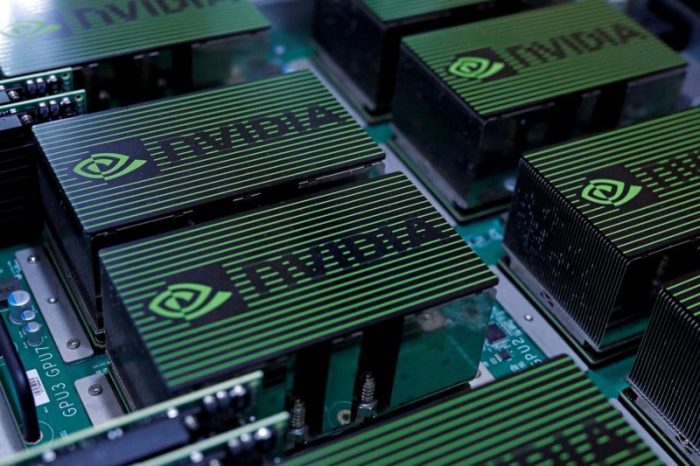Nvidia and AMD agreed to give the US government 15% of revenue from sales to China of advanced computer chips such as Nvidia’s H20 that are used for artificial intelligence applications, a US official said on Sunday.
US President Donald Trump’s administration halted sales of H20 chips to China in April, but Nvidia said last month that the US said it would allow the company to resume sales and it hoped to start deliveries soon.
Another US official said on Friday that the Commerce Department had begun issuing licences for the sale of H20 chips to China.
ALSO SEE: US Unveils 100% Tariff on Imported Chips But Key Firms Exempt
Shares of Nvidia and AMD fell 1.8% and 3.3% respectively in pre-market trade on Monday.
The deal to pay the US government from sales in China is unusual for a president and marks Trump’s latest intervention in corporate decision-making.
He harangues company executives to invest in America to shore up domestic jobs and manufacturing, and demanded last week new Intel CEO Lip-Bu Tan immediately resign, calling him “highly conflicted” due to his ties to Chinese firms.
‘Trading security for revenue?’
“It’s wild,” said Geoff Gertz, a senior fellow at Center for New American Security, an independent think tank in Washington DC.
“Either selling H20 chips to China is a national security risk, in which case we shouldn’t be doing it to begin with, or it’s not a national security risk, in which case, why are we putting this extra penalty on the sale?”
When asked if Nvidia had agreed to pay 15% of revenues to the US, a Nvidia spokesperson said in a statement: “We follow rules the US government sets for our participation in worldwide markets.”
The spokesperson added: “While we haven’t shipped H20 to China for months, we hope export control rules will let America compete in China and worldwide.”
AMD did not respond to a request for comment on the news, which was first reported by the Financial Times earlier on Sunday. The US Department of Commerce did not immediately respond to a request for comment.
Alasdair Phillips-Robins, who served as an adviser at the Commerce Department during former President Joe Biden’s administration, criticized the move.
“If this reporting is accurate, it suggests the administration is trading away national security protections for revenue for the Treasury,” Phillips-Robins said.
Beijing pushing for HBM chips
China’s foreign ministry said on Monday that China had expressed its position on the issue of US chip exports to China many times. In the past, it has accused the US of using technology and trade issues to “maliciously contain and suppress China.”
The Financial Times said the chipmakers agreed to the arrangement as a condition for obtaining the export licences for their semiconductors, including AMD’s MI308 chips.
The decision to allow China greater access to advanced Nvidia and AMD chips follows a push by Beijing to get the United States to ease export controls on chips critical for artificial intelligence as part of a trade deal before a possible summit between Presidents Donald Trump and Xi Jinping.
Trump has reportedly been urging China to take more US soybeans, while Xi’s officials have asked the US to relax export restrictions on high-bandwidth memory (HBM) chips, the FT reported on Sunday.
HBM chips designed by Nvidia and other chipmakers help perform data-intensive AI tasks quickly. They are monitored by investors due to their use alongside AI graphic processors.
China is reportedly concerned that the US HBM controls hamper the ability of Chinese companies such as Huawei to develop their own AI chips.
US administrations have blocked exports of advanced chips to delay Beijing’s AI and defence development.
‘No security compromise’
China represents a significant market for both Nvidia and AMD. Nvidia generated $17 billion in revenue from China in the fiscal year ending January 26, representing 13% of total sales. And AMD reported $6.2 billion in China revenue for 2024, accounting for 24% of total revenue.
Meanwhile, the Trump administration had yet to determine how to use the money it will receive from Nvidia and AMD, it said.
US Commerce Secretary Howard Lutnick said last month the planned resumption of sales of the AI chips was part of US negotiations with China to get rare earths and described the H20 as Nvidia’s “fourth-best chip” in an interview with CNBC.
Lutnick said it was in the US’s interests to have Chinese companies using American technology, even if the most advanced was prohibited from export, so they continued to use an American “tech stack.”
The US official said the Trump administration did not feel the sale of H20 and equivalent chips was compromising US national security.
The official did not know when the agreement would be implemented or exactly how, but said the administration would comply with the law.
- Reuters with additional input and editing by Jim Pollard
NOTE: This report was updated twice with new details and links on August 11, 2025.
ALSO SEE:
‘Conflicted’ Intel CEO Must Resign Over China Ties, Trump Says
Chip And Pharma Tariffs to be Announced Next Week: Trump
Three Detained in Taiwan For Alleged Theft of TSMC Chip Secrets
Cadence and Nvidia Dealings in China Drawing Close Scrutiny
Nvidia CEO Says US Export Curbs on AI Chips is ‘Flawed’ Policy
China’s Xi Issues Rare Warning on Over-Investment in EVs, AI – FT
China Softens Tone on US Ties Amid Potential Thaw In Chip War
TSMC Sees 60% Profit Jump on AI Chip Demand, But Fears Tariffs
China Scrambles for Nvidia’s H20 Chips as Trump ‘Reverses’ Curbs
Nvidia’s Huang Says China’s Military ‘Can’t Rely on US Tech’
US Lawmakers Push Location-Tracking For High Powered AI Chips
























